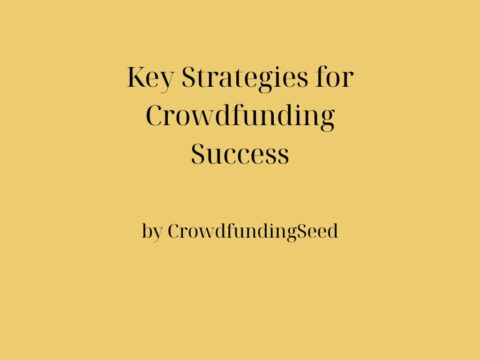Comparison of Key Features Among Popular Crowdfunding Platforms
Here’s a comparison of features for some major crowdfunding platforms—Kickstarter, Indiegogo, GoFundMe, StartEngine, and Patreon—focusing on aspects useful for running a successful campaign:
1. Funding Model
- Kickstarter: All-or-nothing. You only get funds if you hit your goal. This pushes creators to set realistic targets and rally support, but you risk getting nothing if you fall short.
- Indiegogo: Offers flexible funding (keep what you raise) or fixed funding (all-or-nothing). Flexible funding suits projects needing partial funds to start, while fixed mirrors Kickstarter’s approach.
- GoFundMe: Flexible funding. You keep all donations minus fees, ideal for personal or open-ended causes where every bit helps.
- StartEngine: Equity-based, no strict goal requirement. Funds raised are yours as investments, but it’s about selling shares, not meeting a donation target.
- Patreon: Subscription-based. No single goal; it’s recurring support. Creators get ongoing funds, perfect for sustained projects like content creation.
2. Campaign Creation Tools
- Kickstarter: Robust editor for campaign pages with video, images, and reward tiers. Requires a prototype or clear plan, ensuring polished pitches.
- Indiegogo: Similar to Kickstarter but less stringent on prototypes. Includes InDemand, letting you raise funds post-campaign, extending your reach.
- GoFundMe: Simple setup with text, photos, and video. No reward system, focusing on storytelling for donor appeal—quick to launch but basic.
- StartEngine: Detailed pitch tools for equity offerings, including financials and business plans. More complex, aimed at investors, not casual backers.
- Patreon: Customizable pages with tiers for perks. Built for ongoing engagement, with tools for posts and direct messaging to patrons.
3. Reward/Perk System
- Kickstarter: Core feature—backers pledge for rewards like products or experiences. Tiers incentivize higher pledges.
- Indiegogo: Also reward-based, with flexibility to offer perks post-campaign via InDemand. Matches Kickstarter’s approach but with more leeway.
- GoFundMe: No rewards. Pure donation model, relying on emotional connection rather than tangible returns.
- StartEngine: Equity or securities instead of rewards. Investors get ownership stakes, not physical items.
- Patreon: Monthly perks (e.g., exclusive content). Rewards are ongoing, tied to subscription levels, not one-time pledges.
4. Fees
- Kickstarter: 5% platform fee if successful, plus 3-5% payment processing per pledge. No cost if you don’t hit your goal.
- Indiegogo: 5% platform fee for both funding types, plus 2.9% + $0.30 processing per transaction. Flexible funding means fees apply even if you miss your goal.
- GoFundMe: 0% platform fee for personal campaigns in the U.S., but 2.9% + $0.30 processing fee per donation. Donors can tip extra.
- StartEngine: 7-8% of funds raised, plus potential equity fees (e.g., 2%). Higher due to equity complexity and investor vetting.
- Patreon: 5-12% platform fee based on tier (Lite, Pro, Premium), plus 2.9% + $0.30 processing. Higher tiers unlock more features.
5. Audience Reach & Promotion
- Kickstarter: Large, global community of 22 million+ backers, strong for creative projects. Built-in discovery via categories, but you drive most traffic via external promotion.
- Indiegogo: 9 million+ backers, tech-savvy audience. Offers expert support and partnerships (e.g., IndieShop), plus social media tools for sharing.
- GoFundMe: 100 million+ users, best for personal/charity causes. Relies heavily on social sharing; no internal marketplace feel.
- StartEngine: 1 million+ investors, niche for equity seekers. Promotes to accredited and non-accredited investors, with a secondary market for trading.
- Patreon: 8 million+ patrons, creator-focused. Social features (posts, livestreams) keep supporters engaged long-term.
6. Analytics & Support
- Kickstarter: Basic tracking of pledges and backer stats. Support via FAQs and email, but no hand-holding.
- Indiegogo: Detailed analytics on campaign performance, plus optional expert consultations for strategy.
- GoFundMe: Simple dashboard for donation tracking. 24/7 customer care, responsive for urgent needs.
- StartEngine: Portfolio tracking for investors, campaign insights for creators. Legal/financial guidance due to equity focus.
- Patreon: Advanced analytics on patron behavior, earnings, and churn. Creator workshops and integrations (e.g., Discord) enhance management.
7. Best For
- Kickstarter: Creative projects (art, tech, film) needing a defined goal and reward structure.
- Indiegogo: Flexible tech or product launches, especially multi-stage projects.
- GoFundMe: Personal causes, emergencies, or nonprofits wanting quick, donation-based funds.
- StartEngine: Startups seeking equity investment from a broad investor pool.
- Patreon: Creators (artists, writers) needing recurring income over time.
Unexpected Insight
One surprise is how GoFundMe’s lack of rewards shifts the burden entirely to storytelling—success hinges on emotional pull, not incentives. Meanwhile, StartEngine’s equity model flips the script, making it more like a stock market than traditional crowdfunding, which might intimidate casual backers but attracts serious investors.
This breakdown should help you pick a platform based on your campaign’s needs—whether it’s rewards, flexibility, or investor appeal. Let me know if you want a deeper dive into any specific feature or platform!




